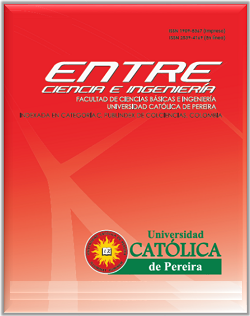A power control algorithm for WLAN basedon Game Theory
DOI:
https://doi.org/10.31908/19098367.4017Keywords:
Power Control, IEEE 802.11, Interference, SDR, game Theory, WLAN.Abstract
The ubiquity and wide deployment of wireless local area networks (WLAN) have increased the inherent risk of interference. Numerous studies have shown that power control is an efficient alternative to deal with interference and an outstanding framework for modeling scenarios in which user equipments perform power control is game theory. However, the research in this field has focused on the theoretical analysis and system-level simulations given the complexity of implementing power control in a real environment. This paper shows the implementation of a power control algorithm for WLAN based on game theory (GT), specifically, the IEEE 802.11.a standard using software defined radio (SDR) platforms and reconfigurable hardware. The results show that the algorithm significantly increases the energy savings and energy efficiency of the stations (STA) and decreases the interference. The interference reduction improves the overall network performance, decreasing the FER, and increasing the throughput.
Downloads
References
Qureshi, A. “Interference diagnosis in wireless systems by using NI USRP,” Int. J. Simul. Syst. Sci. Technol., vol. 16, no. 6, p. 10.1-10.10, 2015.
Wang, I., and Chang, L. “Impact of power control on performance of IEEE 802.11 wireless networks,” IEEE Trans. Mob. Comput., vol. 6, no. 11, pp. 1245–1258, 2007.
Chang, C., and Chang, H. “Power control and fairness MAC mechanisms for 802.11 WLANs,” Comput. Commun., vol. 30, no. 7, pp. 1527–1537, 2007.
Qiao, D., Choi, S., and Shin, K. G. “Interference analysis and transmit power control in IEEE 802.11a/h wireless LANs,” IEEE/ACM Trans. Netw., vol. 15, no. 5, pp. 1007–1020, 2007.
Mackenzie, A. B., and Wicker, S. B. “Game Theory in Communications: Motivation, Explanation, and Application to Power Control,” in GLOBECOM ’01, 2001, pp. 821–826.
Cheng, Z., Zhou, X., Ding, Y., and Miao, X. “A Cooperative Differential Game of Transmission Power Control in Wireless Networks,” Wirel. Pers. Commun., vol. 72, no. 4, pp. 2015–2027, 2013.
Huehn, T., and Sengul, C. “Practical power and rate control for WiFi,” 21st Int. Conf. Comput. Commun. Networks, ICCCN, 2012.
Mirama, V., and Quintero, V. “Control de potencia basado en teoría de juegos en sistemas de comunicaciones inalámbricas,” Gerenc. Tecnol. Inform., vol. 15, pp. 69–78, 2016.
Romp, G. “Experimental Economics,” in Game Theory Introduction and applications., Oxford University Press, Ed. New York: Oxford University Press, 1997, pp. 229–262.
Hamidou, S. L. “A very short tour of Game Theory,” in Game Theory and Learning for Wireless Network, Fundamentals and Applications, Oxford: Academic Press, 2011, pp. 3–40.
Smith, D. B., Portmann, M., Tan, W. L., and Tushar, W. “Multi-source-destination distributed wireless networks: Pareto-efficient dynamic power control game with rapid convergence,” IEEE Trans. Veh. Technol., vol. 63, no. 6, pp. 2744–2754, 2014.
Hoyos, E., Trujillo, D., and Bermudez, H. “Access point selection in 802.11 Wireless networks ensuring minimum capacity for QoS based on power control,” vol. 10, pp. 167–177, 2013.
El-Sabe, Y. M., Esameldin, M., and Ashour, M. “Enhanced Rank Based Cooperative Game (ERBCG) strategy for IEEE 802.11s Mesh WLAN power management,” 2013 9th Int. Wirel. Commun. Mob. Comput. Conf. IWCMC 2013, pp. 375–380, 2013.
Suman, S. K., Kumar, D., and Bhagyalakshmi, L. “SINR pricing in non-cooperative power control game for wireless ad hoc networks,” KSII Trans. Internet Inf. Syst., vol. 8, no. 7, pp. 2281–2301, 2014.
Suman, S. K., Kumar, D., and Bhagyalakshmi, L. “Non cooperative power control game with new pricing for wireless ad hoc networks,” Int. Rev. Comput. Softw., vol. 9, no. 1, pp. 18–28, 2014.
Kim, S. “Adaptive online power control scheme based on the evolutionary game theory,” IET Commun., vol. 5, no. 18, pp. 2648–2655, 2011.
Michalski, M., and Michalski, K. “A simple performance-boosting algorithm for transmit power control in WLAN access points,” 2016 21st Int. Conf. Microwave, Radar Wirel. Commun. MIKON 2016, pp. 4–7, 2016.
Park, B. H., Kwon, Y. M., Bae, S. J., and Chung, M. Y. “Implementation of connection management scheme of mobile stations in IEEE 802.11 WLAN APs considering transmission power control,” IEEE 2013 Tencon - Spring, TENCON Spring 2013 - Conf. Proc., pp. 515–519, 2013.
Cárdenas, M., and Chapid, J. “Implementación de un algoritmo de control de potencia basado en la teoría de juegos en un sistema multicelular limitado por interferencia con portadora única.,” 2015.
Cerón, A., and Rosero, D. “Incidencia de un algoritmo de control de potencia en la capacidad de una red heterogénea.,” Universidad del cauca, Popayán, 2016.
Bloessl, B., Segata, M., Sommer, C., and Dressler, F. “An IEEE802.11a/g/p OFDM Receiver for GNU Radio,” Proc. 2013 2nd ACM SIGCOMM Work. Softw. Radio Implement. Forum {(SRIF)}, pp. 9–15, 2013.
Ettus Research, “USRP B200/B210 Specification Sheet,” Ettus Research, 2014. [Online]. Available: https://www.ettus.com/content/files/b200-b210_spec_sheet.pdf.






 Revista Entre Ciencia e Ingeniería
Revista Entre Ciencia e Ingeniería .png) entrecei@ucp.edu.co
entrecei@ucp.edu.co.png) ISSN (Impreso) 1909-8367 - ISSN (En Línea) 2539-4169
ISSN (Impreso) 1909-8367 - ISSN (En Línea) 2539-4169 Attribution-NonCommercial 4.0 International (CC By-NC 4.0)
Attribution-NonCommercial 4.0 International (CC By-NC 4.0)
.png) Carrera 21 No. 49-95 Av. de las Américas, Pereira, Risaralda, Colombia
Carrera 21 No. 49-95 Av. de las Américas, Pereira, Risaralda, Colombia